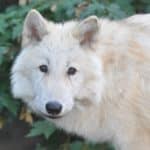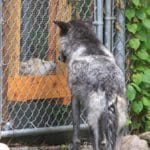Axel, along with his littermate Grayson, was born at a facility in Canada on May 2, 2016, and came to the Center on May 25, 2016. Axel was easily distinguished by his almond-shaped eyes, somewhat slimmer face, and narrow sloping muzzle. Of the two brothers, Axel always displayed more physically domineering behaviors toward his packmates. He often reacted with high excitement to pack dynamics with a high-rotating tail. He had a strong and bold presence within his pack throughout the years.
Axel represented the population of wolves found in the Arctic region. Arctic wolves’ native habitat is found in the northern regions of North America as well as along the eastern and northern shores of Greenland. Several large islands occupy this region including Ellesmere and Axel Hieberg islands. Axel’s name was selected in honor of the wolves that range on Axel Hieberg Island. This region is typically snow-covered for most of the year, but a mid-June to mid-August thaw supports enough plant material to feed the arctic wolf’s prey: musk-ox, caribou, and arctic hares.
In the 2022-2023 winter, the wolf care team noticed slight changes to his skin and coat condition. In May 2023, Axel was diagnosed with sebaceous adenitis (SA). This rare skin condition affects sebum production by the sebaceous glands, which not only help maintain the skin’s hydration but also act as a barrier against microorganisms. While the treatment plan helped restore his skin and coat condition, we suspect it may have affected him in other ways. On April 19, 2024, Axel was retired from the Exhibit Pack after wolf care staff reviewed security camera footage and observed Axel having a seizure. His retirement allowed staff to closely monitor him 24 hours a day. Unfortunately, lab work confirmed that Axel was in severe kidney failure. The effects of extreme kidney failure likely contributed to his seizures. After consultation with the wolf care team and the veterinarian, it was agreed that because of Axel’s complex medical condition, the irreversible kidney failure and concerns about his quality of life going forward, humane euthanasia was the only option. Axel passed away on April 21st, 2024, surrounded by his wolf care team.
For more information on our ambassador wolves, we encourage you to watch extended wolf videos on the International Wolf Center’s YouTube Channel or enjoy a close-up of wolf behavior on our Wolf Watch Cams. Your support and interest in our Exhibit Pack are greatly appreciated.

The International Wolf Center uses science-based education to teach and inspire the world about wolves, their ecology, and the wolf-human relationship.





